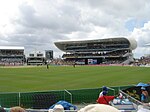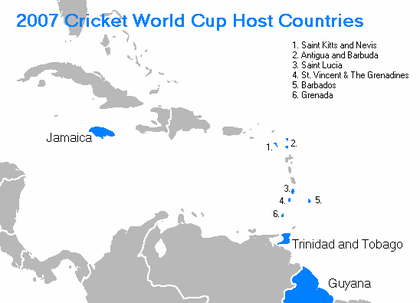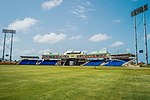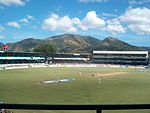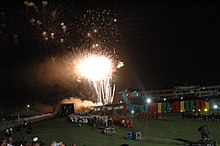
The Cricket World Cup is the international championship of One Day International (ODI) cricket. The event is organised by the sport's governing body, the International Cricket Council (ICC), every four years, with preliminary qualification rounds leading up to a finals tournament. The tournament is one of the world's most viewed sporting events and considered as the "flagship event of the international cricket calendar" by the ICC. It is widely considered the pinnacle championship of the sport of cricket.

The Sri Lanka men's national cricket team, nicknamed The Lions, represents Sri Lanka in men's international cricket. It is a full Member of the International Cricket Council (ICC) with Test, One-Day International (ODI) and T20 International (T20I) status. The team first played international cricket in 1926–27 and became an associate member of the ICC in 1965. They were awarded the Test status in 1981, which made Sri Lanka the eighth Test cricket-playing nation. The team is administered by Sri Lanka Cricket.

The Asia Cup, officially known as the ACC Men’s Asia Cup is a men's international cricket tournament contested between Asian countries in either One Day International format and Twenty20 International format every 2 years. It was established in 1983 when the Asian Cricket Council was founded as a measure to promote goodwill between Asian countries being the only continental championship in cricket where the winning team becomes the champion of Asia. India are the current champions after winning the 2023 edition.
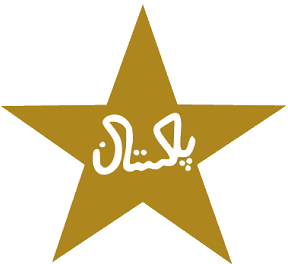
The Pakistan national cricket team has represented Pakistan in international cricket since 1952. It is controlled by the Pakistan Cricket Board (PCB), the governing body for cricket in Pakistan, which is a Full Member of the International Cricket Council (ICC). Pakistan compete in cricket tours and tournaments sanctioned by the PCB and other regional or international cricket bodies in Test, One Day International (ODI), and Twenty20 International (T20) formats. Pakistan are current ICC Champions Trophy holders.

Stephen Anthony Bucknor, OJ is a Jamaican former international cricket umpire.

Robert Andrew Woolmer was an English cricket coach, cricketer, and a commentator. He played in 19 Test matches and six One Day Internationals for the England cricket team and later coached South Africa, Warwickshire and Pakistan. During his coaching career with South Africa, he led the team to being the winners of the 1998 ICC KnockOut Trophy, the only ICC title the country has won till date.
Simon James Arthur Taufel is an Australian former cricket umpire who was earlier a member of the ICC Elite umpire panel. He won five consecutive ICC Umpire of the Year awards between 2004 and 2008, and is widely regarded as one of the top 10 the greatest umpire of all time. He announced his retirement from international cricket on 26 September 2012, after the 2012 ICC World Twenty20 final. He subsequently worked as the ICC's Umpire Performance and Training Manager until October 2015. In 2020 he joined the Channel Seven commentary team as an expert commentator for the 2020/21 test series.

Aleem Dar PP is a Pakistani cricket umpire and former first-class cricketer. He has been a member of the Elite Panel of ICC Umpires. Dar won the David Shepherd Trophy three years in a row from 2009 to 2011, after being nominated twice in 2005 and 2006. Aleem Dar, Marais Erasmus, Richard Kettleborough, Kumar Dharmasena and Simon Taufel were the only umpires to have received the award from its inception until 2017. Before becoming an umpire, Dar played first-class cricket as a right-handed batsman and a leg-break bowler for Allied Bank, Gujranwala, Lahore and Pakistan Railways teams.
Deshabandu Handunnettige Deepthi Priyantha Kumar Dharmasena is a Sri Lankan cricket umpire and former international cricketer. He is a member of the Elite Panel of ICC Umpires and the first person to participate in an ICC Cricket World Cup final both as a player and an umpire. A right-handed batsman and a right-arm off break bowler, Dharmasena was a member of the Sri Lankan side that won the 1996 Cricket World Cup.
International cricket played in the 2006 cricket season is defined as matches scheduled between May and August 2006 in all cricketing countries, as well as all international matches scheduled for the 2006 English cricket season. Matches between January and April are defined as belonging to the 2005–06 season, while matches between September and December are defined as the 2006–07 season. The main matches in this period were played in England, as this was in the middle of the English cricket season, but the third edition of the ICC Intercontinental Cup is defined as a part of the 2006 season, even though the tournament stretched into February 2007, and three A teams were also scheduled to tour the northwestern part of Australia in June and July 2006.

The 2006 ICC Champions Trophy was a One Day International cricket tournament held in India from 7 October to 5 November 2006. It was the fifth edition of the ICC Champions Trophy. The tournament venue was not confirmed until mid-2005 when the Indian government agreed that tournament revenues would be free from tax. Australia won the tournament, their first Champions Trophy victory. They were the only team to get one loss in the tournament, as all other teams lost at least two matches. West Indies, their final opponents, beat Australia in the group stage but were bowled out for 138 in the final and lost by eight wickets on the Duckworth–Lewis method. West Indies opening batsman Chris Gayle was named Player of the Tournament.

The ICC Men's T20 World Cup, is the Twenty20 International cricket tournament, organised by the International Cricket Council (ICC) since 2007.
The following is a list of important cricket related events which occurred in the year 2007.
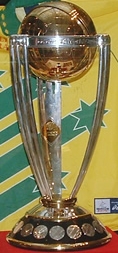
The Cricket World Cup, the top-level and the most important competition in One Day International cricket, was first played in 1975. This tournament, known as The Prudential World Cup, was played in England and was won by the West Indies. Since then, the tournament has been played every four years, in a number of different countries. Between eight and sixteen teams have contested the various competitions, and lengths of matches have ranged from 60 overs per side in the early tournaments down to 50 overs per side in recent ones.

Deshabandu Pinnaduwage Aravinda de Silva is a former Sri Lankan cricketer and captain, Regarded as one of the best Sri Lankan cricketer, he played in the team as an all-rounder. De Silva was a key member of the Sri Lankan team that won 1996 Cricket World Cup, where he scored a match winning century in the final, that brought Sri Lanka from underdog status to present-day form. He has held various posts in Sri Lankan Cricket after his retirement in 2003. He was inducted into ICC Cricket Hall of Fame in 2023.
The 2014 Asia Cup was the twelfth edition of the Asia Cup cricket tournament. The tournament was held in Bangladesh from 25 February to 8 March 2014. Pakistan were the defending champions, having won the previous tournament. The tournament included the four Asian test-playing nations, Bangladesh, India, Pakistan and Sri Lanka; and ICC Asian Associate member Afghanistan. This was the first 50-over tournament in which Afghanistan took part. Ten league matches were played along with the final. The title sponsors of the tournament were Arise India and it was powered by Cycle Agarbathis. Sri Lanka Beat Pakistan in the final to become Asia Cup champions for the fifth time.

The 2017 Women's Cricket World Cup was an international women's cricket tournament that took place in England from 24 June to 23 July 2017. It was the eleventh edition of the Women's Cricket World Cup, and the third to be held in England. The 2017 World Cup was the first in which all participating players were fully professional. Eight teams qualified to participate in the tournament. England won the final at Lord's on 23 July, after India fell short by 9 runs in pursuit of England's total of 228/7.

The 2017 ICC Champions Trophy was the eighth ICC Champions Trophy, a cricket tournament for the eight top-ranked One Day International (ODI) teams in the world. It was held in England and Wales from 1 to 18 June 2017. Pakistan won the competition for the first time with a 180-run victory over India in the final at The Oval. The margin of victory was the largest by any team in the final of an ICC ODI tournament in terms of runs.

The 2018 Asia Cup was a One-Day International (ODI) cricket tournament that was held in the United Arab Emirates in September 2018. It was the 14th edition of the Asia Cup and the third time the tournament was played in the United Arab Emirates, after the 1984 and 1995 tournaments. India were the defending champions, and retained their title, after beating Bangladesh by three wickets in the final.

The 2018 ICC Under-19 Cricket World Cup was an international limited-overs cricket tournament held in New Zealand from 13 January to 3 February 2018. It was the twelfth edition of the Under-19 Cricket World Cup, and the third to be held in New Zealand after the 2002 and the 2010 events. New Zealand became the first country to host the event thrice. The opening ceremony took place on 7 January 2018. The West Indies were the defending champions. However, they failed to defend their title, after losing their first two group fixtures.


